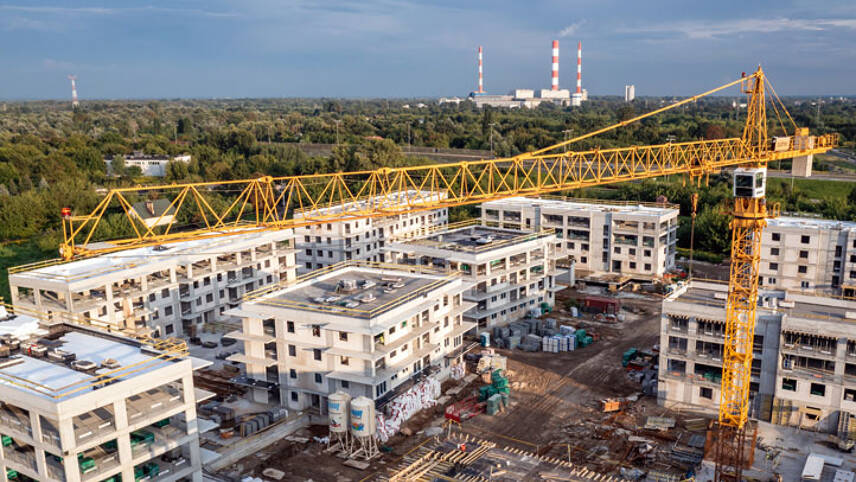Register for free and continue reading
Join our growing army of changemakers and get unlimited access to our premium content

Pictured: Apartments under construction in Poland
The end objective is to make Europe’s entire building stock climate neutral by 2050, in line with the EU’s aim of cutting emissions to net-zero by mid-century.
“We have achieved something remarkable this evening. We created a blueprint for the transition towards a zero-emission building stock,” said Ciarán Cuffe, a green lawmaker from Ireland who was the lead speaker on the EPBD revision for the European Parliament.
Solar rooftops will also need to be deployed in all new residential buildings as of 2030 and fitted progressively elsewhere as part of a provisional deal between the European Parliament and the 27 EU member states in the Council of the EU.
Under the deal, all new buildings will have to be zero-emission as of 2030, an objective that is brought forward to 2028 for new buildings occupied or owned by public authorities.
Legal experts are now scrutinising the political agreement the Parliament and Council reached before it is sent back to both institutions for formal approval. The Parliament’s industry committee has tentatively scheduled a vote for 23 January 2024.
But it was a long road for the lawmakers who appeared exhausted after two years of strenuous talks since the European Commission tabled its proposal in December 2021.
“Delighted and relieved that after two years of work and a lot of very tough meetings, we now have a deal on EPBD,” said MEP Seán Kelly, a centre-right lawmaker from Ireland who was the lead negotiator for the European Parliament.
Unpicking the EPBD deal
The Commission’s initial proposal was designed around new mandatory renovation targets for the 15% least efficient buildings, with the introduction of “minimum energy performance standards” applying across the EU’s entire building stock.
But following fierce opposition from EU countries, that approach has been abolished in favour of benchmark averages for each EU country.
Commercial and public buildings will be first in line. By 2030, they will have to be more energy efficient than the 16% worst-performing buildings and rise above the 26% worst-performing by 2033.
Europe’s 100 million residential buildings were the most tricky to agree on as EU countries were reluctant to intervene.
Those will need to achieve a 16% reduction in primary energy consumption by 2030 and hit a range of 20-22% by 2035, with more than half of those reductions (55%) achieved by renovating the “worst performing buildings,” the Council said in a statement.
Given that almost half (43%) of residential buildings will be considered “worst performing,” that obligation is somewhat diluted. Therefore, the remaining half of energy consumption reduction will be expected to come from a gradual switch to clean heating solutions, like heat pumps.
Eva Brardinelli, buildings expert at CAN Europe, a climate NGO, says the new rules are unlikely to spark additional efforts by EU countries to bring renovation rates above the current average of 1% annually.
The requirement to phase out fossil heaters was also softened and pushed back from 2035 to 2040 to win backing from EU member states.
From 2025, EU countries will have to stop subsidising “standalone” fossil heating systems, a phrasing that keeps the door open for hybrid boilers running partly on renewables. The end objective is to decarbonise heating “to completely phase out fossil fuel boilers” by 2040.
A provision mandating homeowners to install solar panels on their rooftops has been softened, too, with existing residential buildings unaffected by the obligation. Instead, the solar mandate will apply only to “new buildings, public buildings and existing non-residential ones” when they undergo a “renovation action that requires a permit”.
Newly constructed buildings will have to be zero-emission as early as 2030, depending on how EU countries implement the rules.
Additional exceptions include agricultural and heritage buildings, which can be exempted from the new rules, alongside buildings with “special architectural or historical merit” and churches and other places of worship.
EU consumer group BEUC said lawmakers had “missed an opportunity” to make home renovation easier for households, for example by failing to harmonise the patchwork of energy performance certificates and standards currently in place across EU regions.
“For consumers, this leaves them with a confused picture. They know they will need to renovate their homes, and much-needed one-stop shops will be available to help them. But Energy Performance Certificates will remain confusing and inaccurate, and finance will not be easy enough to obtain,” said Monique Goyens, director general of BEUC.
Focus on implementation
With the EPBD now agreed upon, the focus is shifting to implementation by EU member states, which are expected to translate the new directive into national renovation plans.
“Time to roll up our sleeves, walk the talk and turn our attention to deliver the full EPBD potential through robust institutional governance and private-public partnerships,” said Quentin Galland, chair of the EU Alliance to Save Energy (EU-ASE), an industry-led association.
Similarly, environmental NGOs are already looking to the next fight.
“Even though this directive has lost its potential of contributing to remarkable change, it is still one small step towards the implementation phase at the national level, where the true fight for ambition will take place,” said CAN’s Brardinelli.
Nikolaus J Kurmayer, EurActiv.com
This article first appeared on EurActiv.com, an edie content partner


Please login or Register to leave a comment.